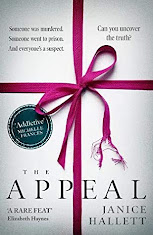Tuesday, December 28, 2021
Review: The Appeal by Janice Hallett
Review: Anatomy of a Heretic by David Mark
 |
| State Library of NSW Ongeluckige voyagie, 1645, by Francisco Pelsaert |
Monday, December 27, 2021
The VERY raunchy history of sex in the Middle Ages is revealed in a new book
The Bright Ages: A New History of Medieval Europe by Matthew Gabriele & David Perry
Sunday, December 26, 2021
Big Trouble in the “93”: Olivier Norek’s Banlieue Trilogy
Sunday, December 12, 2021
Review: The Return of the Pharaoh by Nicholas Meyer
Review: The Return of Hester Lynton by Tony Evans
- The Case of the Fanshaw Inheritance (competition for an inheritance involving a treasure hunt)
- The Case of the Stolen Leonardo (a stolen master, a locked room, forgery)
- The Case of the Missing Professor (missing formula, traitors)
- The Mystery of the Locked Room (mysterious death, question of family inheritance)
- The Adventures of the Diamond Necklace (missing necklace, scandal, secret organisation)
- The Adventure of the Kidnapped Schoolboy (missing child that is not straight-forward)
- The Puzzle of the Whitby Housemaid (Bram Stoker brings a case involving a mysterious doctor and a scared maid)
- The Case of the Russian Icon (swindled museum, double-cross)
- The Case of the Naked Clergyman (eccentric clergyman and an inheritance at issue)
- The Problem of Oscar Wilde (Oscar seek Hestor's help in recovering stolen letters)
"Maud was real-life private detective who was London’s and, I suspect, the UKs only female private detective at start of the twentieth century. Quite a celebrity in her day, with a career spanning more than thirty years, West claimed her work took her all over the globe, from London to Paris, to the U.S and back again. A renowned mistress of disguise she often impersonated men from all walks of life – from sailors to aristocrats."
Review: Four Thousand Days by MJ Trow
I am very interested to see how Trow develops Margaret's future narrative and where we will see her next.
Saturday, December 11, 2021
Review: Kill The King by David Lawrence-Young
Review: On the Trail of Sherlock Holmes by Stephen Browning
Review: The Coconut Killings by Patricia Moyes
Review: The Acupuncture Murders by Dwight Steward
Wednesday, December 1, 2021
Alex Connor's Art Mystery Novels
Monday, November 29, 2021
Review: All The Old Knives by Olen Seinhauer
Review: No Light Without Shadow by Luke Gracias
 |
| Codex Gigas |
Review: The Heretic by Liam McIlvanney
 |
| Image by Nick Hedges |
"They only worked with the guys from their area and it was very hard to break into that. We could always get some people who would be grasses and we could work on that, plus there would be decent people in the areas who would help us build a picture of who was in the gangs and who was associated with them. But it was a tough game."
Review: The Challenges of King by KM Ashman
Apparently There Were Complaints by Sharon Gless
Saturday, November 27, 2021
Index, A History Of The ... by Dennis Duncan
A story of ambition, obsession and alphabetical order .....
Most of us give little thought to the back of the book - it's just where you go to look things up. But here, hiding in plain sight, is an unlikely realm of ambition and obsession, sparring and politicking, pleasure and play. Here we might find Butchers, to be avoided, or Cows that sh-te Fire, or even catch Calvin in his chamberwithaNonne. This is the secret world of the index: an unsung but extraordinary everyday tool, with an illustrious but little-known past. Here, for the first time, its story is told.
Charting its curious path from the monasteries and universities of thirteenth-century Europe to Silicon Valley in the twenty-first, Dennis Duncan reveals how the index has saved heretics from the stake, kept politicians from high office and made us all into the readers we are today. We follow it through German print shops and Enlightenment coffee houses, novelists' living rooms and university laboratories, encountering emperors and popes, philosophers and prime ministers, poets, librarians and - of course - indexers along the way. Revealing its vast role in our evolving literary and intellectual culture, Duncan shows that, for all our anxieties about the Age of Search, we are all index-rakersat heart, and we have been for eight hundred years.



































